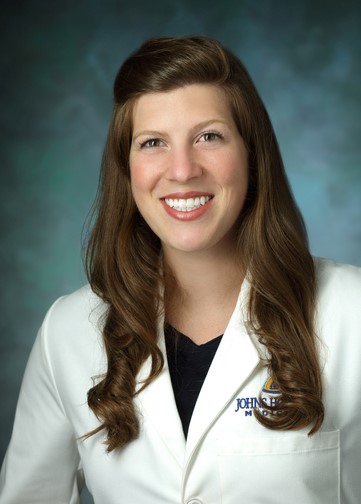Takeaway
What we say to patients has the power to promote healing.

Lifelong learning in clinical excellence | November 20, 2018 | 2 min read
By Helen Bradshaw, MD, Johns Hopkins University School of Medicine
For the past two and a half weeks, I have been part of a clinical team on the inpatient psychiatric unit at Johns Hopkins Bayview Medical Center. Our multidisciplinary healthcare team includes an attending physician (Margaret Chisolm), two first year psychiatry residents (myself and Julia Ross), an occupational therapist, two social workers, a nurse, and – for the last week – two medical students. Each day we care for up to ten patients suffering from a variety of psychiatric conditions, including – but not limited to – schizophrenia, traumatic brain injury, depression, mania, demoralization, and/or substance use disorders. Yesterday on closler, Dr. Chisolm shared her perspectives on teaching and learning as part of clinical excellence. Today, I’ll focus on the healing power of the words we speak to our patients.
Martha had fallen behind on bills, stopped eating, and was no longer able to care for her husband, George, who was struggling with Parkinson’s disease and advanced dementia. Martha was severely depressed. She was fifty pounds underweight and consumed with the delusion that she had hijacked someone else’s identity. George required constant supervision. They arrived together in the emergency department, but departed upon George’s placement in a memory home and Martha’s admission to our psychiatric unit – an unfortunate separation of a couple in distress, who had been each other’s closest companions for nearly five decades.
Martha struggled to move from her hospital bed, and described feeling “lost” on the unit, full of worry that she, too, had dementia. Dr. Chisolm assured her, “depression is a treatable illness, you will get better.” Days passed and she began a book, changed out of her hospital gown and into a smart floral button up, and wrote a letter to her husband. She remained oblivious to these improvements – she apologized for her memory, yet scored well on cognitive assessments; she doubted her concentration, but devoured the limited collection of mystery novels on the unit.
“You’re looking better, Mrs. D.” Her eyes met mine, no longer cast to the floor, where they had typically rested. Dubious, but wanting it to be true, she asked, “You think?” Each day, we shared our observations of her improvement, data points collected from the morning’s mental status exam, persuading her to see around the narrow blinders of her depression.
Martha continued to improve. She organized a walking group, pacing the two short halls of the unit with her crew, became a keen Uno competitor, and no longer believed that she had stolen another patient’s identity. Our daily descriptions of her improvement, echoed back to her, supported her progress. Eventually, she became aware of her progress, stating that reading and engaging with others was becoming easier and more enjoyable. She was eager to return to living independently. Martha successfully claimed the hope that Dr. Chisolm and the team had nurtured while she was so overwhelmed by depression and blind to any possibility other than illness in her future.
During my brief time as an intern in psychiatry, I have observed two simple statements repeatedly offered to severely depressed patients, with a surprisingly profound influence on the healing process: “You may not feel better, but you’re looking better,” and, in explanation, “others can often see your depression lifting before you might.”

